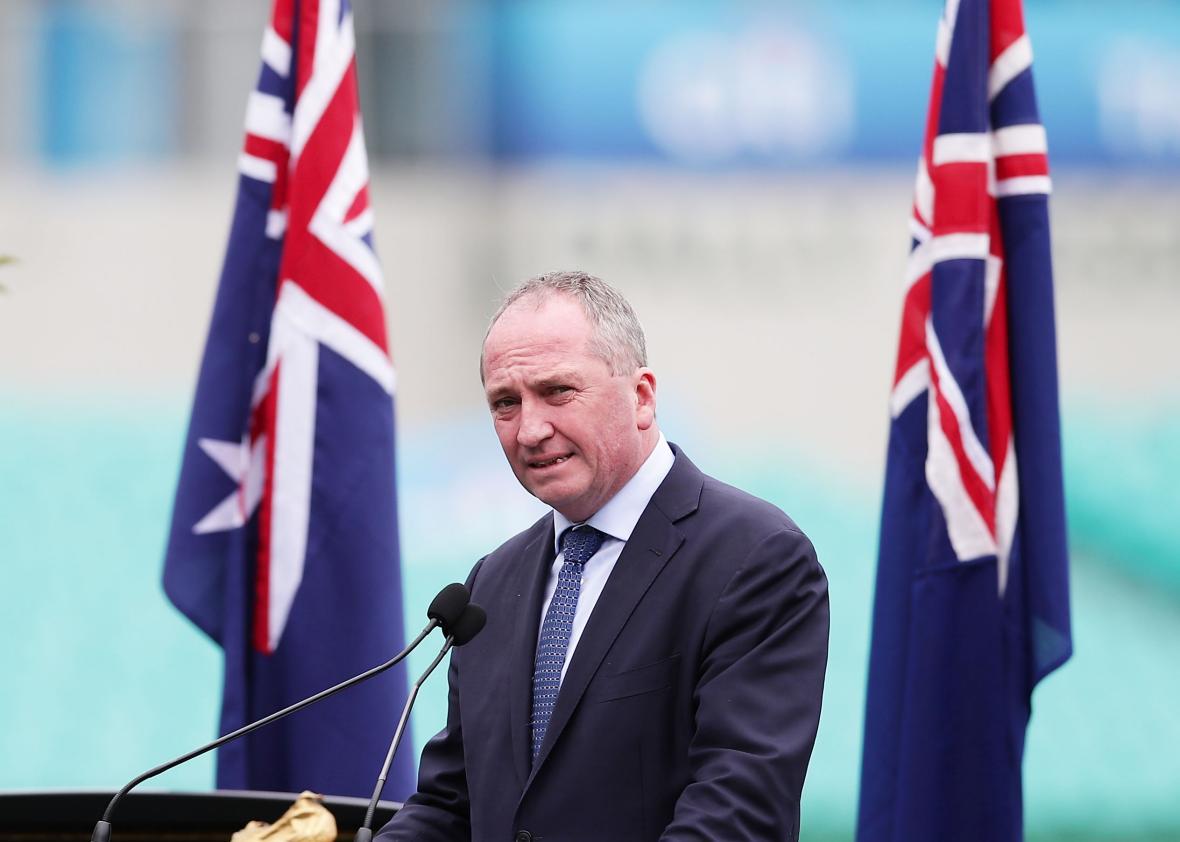Birtherism is back in the political news, this time in Australia—and unlike the nutty theories about former President Barack Obama, the accusations are based in reality and are costing politicians their jobs. In the latest and daffiest chapter in the saga, Australian Deputy Prime Minister Barnaby Joyce was nominated for 2018 New Zealander of the Year.
A few weeks ago, no one would have imagined he was eligible for the award. But over the past month, several members of the Australian Parliament, including Joyce, have learned a thing or two about their citizenships, running afoul of the constitution in the process. Section 44, now the Australian Constitution’s most famous section, states that a person is ineligible to be elected to the Senate or the House if they are “under any acknowledgment of allegiance, obedience, or adherence to a foreign power, or is a subject or a citizen or entitled to the rights or privileges of a subject or a citizen of a foreign power.” In other words, dual citizens may not run for office unless they renounce their transnational rights, regardless of whether they feel any allegiance to another country or are even aware of their status. “Citizen” is defined loosely, with many people entitled to the privileges of foreign nationals without actually holding the passport.
It all started on July 14, when popular Greens party Sen. Scott Ludlam stepped down after discovering that he had always been a New Zealand citizen, having received Kiwi rights by default from being born there. He was quickly followed by fellow Greens Sen. Larissa Waters (who made headlines earlier this year for being the first to breastfeed on the Parliament floor), who realized that Canada had changed its citizenship laws since her birth there to allow for dual citizenship, making her a Canadian and disqualifying her from the Australian Senate.* The Australian Greens were derided by the government as careless and unprofessional, with Prime Minister Malcolm Turnbull calling it “incredible sloppiness” and “extraordinary negligence.”
Yet it was only the beginning of a Section 44 purge that would begin wiping out members of Parliament by the handful. By July 25, the citizenship shoe was on the other foot. Resources Minister Matt Canavan realized his mother had applied for Italian citizenship on his behalf and resigned from the Cabinet, with the government referring the case to the High Court. There was a rush of overseas-born MPs falling over themselves to produce letters of renunciation, proof of their singular loyalty to Australia. Independent Sen. Nick Xenophon, of Cypriot heritage, teamed up with Iranian-born Labor Party Sen. Sam Dastyari to conduct a mock trilingual press conference to point out that they, as two of the Senate’s more exotic members, were not the ones getting caught out by Section 44. (“We’re feeling much more Aussie than our colleagues today,” quipped Dastyari.) Soon after, Xenophon discovered he was in fact a British citizen because Cyprus had been under British colonial rule when his father fled to Australia in 1951; Xenophon thus referred himself to the High Court.
Sen. Malcolm Roberts of Australia’s white nationalist party, One Nation, was probably a citizen of two nations at the time of his 2016 election, as confirmation of his British renunciation did not arrive until five months later. Disqualified senators are one thing: By law, they can be replaced by the next candidate of that party on the ballot. But in the lower house, the position must be filled by special election. If newfound Kiwi Barnaby Joyce—whose father was born in New Zealand and who has now been confirmed to be a citizen by the New Zealand Department of Internal Affairs—loses his seat, he may take the whole government down with him: The Liberal-National coalition holds the government by a one-vote majority. Foreign Minister Julie Bishop went so far as to accuse the opposition Labor Party and the New Zealand Labour Party of colluding to “undermine the Australian government.”
The farce has reached peak absurdity, with each new announcement less surprising than the last. And truly, it has revealed the depth of partisan double standards: It’s deliciously entertaining when it happens to a pollie you despise but a preposterous tragedy when it happens to one of your own. Although Ludlam and Waters announced their immediate resignations (with conservatives even calling for them to pay back their salaries), those on the right have refused to step down, deferring their resignations until after an October High Court challenge, which experts agree they are likely to lose. Though the law is arcane, it is—as Joyce himself insisted when it was the Greens who had violated it—“written in black and white and it has to be complied with,” and it seems unlikely that the man who once threatened to kill Johnny Depp’s dogs will survive (politically speaking).
Written in the 1890s, when multiculturalism was perceived as a threat, Section 44 makes little sense today. And it’s those who have the most tangential links to other countries who are being caught out by it. Candidates who are aware of their second citizenship regularly renounce. (Two of the past four prime ministers were born in the U.K. and renounced.) It’s those with the weakest connection to their foreign nationality who are losing their jobs.
Poor Barnaby. Unknowingly a New Zealander by birth, the deputy prime minister may soon lose his title. But at least he’s now in the running for an even greater honor: Kiwi of the Year.
*Correction, Aug. 30, 2017, at 6:56 p.m.: This article originally described the process by which Waters was conferred with dual citizenship inaccurately.
